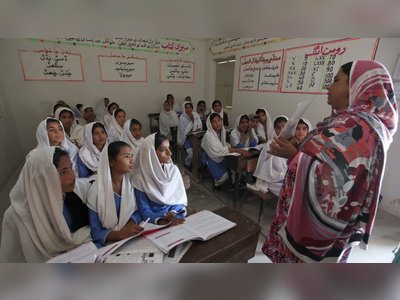Escalating Tensions Between Ethiopia and Eritrea Amidst Fears of Imminent Conflict
Military preparations intensify as calls for international intervention grow in wake of deteriorating relations.
Tsedakan Kebretzeyh, Deputy Governor of Tigray region, has warned that war between Ethiopia and Eritrea is on the verge of eruption, citing that military preparations have reached their final stages.
In statements to local media, Tsedakan, who previously held the position of Chief of Staff of the Ethiopian Defense Forces, indicated that the conflict could extend from Tigray to neighboring countries such as Sudan, potentially impacting the stability of the Red Sea region.
Tsedakan emphasized that Tigray is striving to avoid war and promote peace, yet the available options are rapidly diminishing, leading to the possibility of armed conflict becoming a reality.
He noted a significant deterioration in relations between Addis Ababa and Asmara since the signing of the Pretoria peace agreement, increasing the likelihood of extensive military confrontations.
Tsedakan accused the Eritrean government of pursuing an aggressive expansionist policy, suggesting that Asmara seeks to exploit neighboring countries, particularly Ethiopia and Sudan, to enhance its regional influence.
He described Tigray as the main obstacle to the ambitions of Eritrean President Isaias Afwerki, accusing Eritrea of preparing for war aimed at overcoming what Afwerki considers the hindrances to his plans following the Pretoria agreement.
Moreover, Tsedakan cautioned that internal divisions within Tigray could complicate the political landscape, pointing out that some leaders within the Tigray People’s Liberation Front are seeking alliances with Isaias Afwerki to safeguard their interests, despite being aware of the potential risks involved.
He warned that any renewed conflict between Ethiopia and Eritrea could result in major geopolitical and territorial shifts in the Horn of Africa and the Red Sea region, particularly as the international community is focused on other pressing crises such as the war in Ukraine and unrest in the Middle East.
He called for urgent international intervention and action from the Ethiopian government to avert the outbreak of war, underscoring that fully implementing the Pretoria agreement remains the best option.
Tsedakan added that if diplomatic efforts fail to prevent the war, swiftly ending it, either militarily or politically, would be in the best interest of Tigray and the broader region.
The roots of the conflict trace back to 2018, when, after nearly two decades of stalemate between the two nations, Prime Minister Abiy Ahmed and President Isaias Afwerki signed a peace agreement that ended the state of no peace, no war and earned Abiy the Nobel Peace Prize.
However, many in both countries criticize the reconciliation as being personal between the two leaders, without the involvement of other stakeholders.
On November 2, 2022, the Ethiopian government and the Tigray People's Liberation Front signed a peace agreement in Pretoria, South Africa, mediated by the African Union, thereby ending a two-year civil war in Tigray that had spilled into neighboring regions such as Amhara and Oromia, approaching the capital Addis Ababa.
The consequences of this agreement have seen relations between Ethiopia and Eritrea deteriorate once more, returning to a state of stagnation, with Asmara perceiving the agreement as a betrayal by a former ally in the fight against the Tigray Liberation Front.
Eritreans expressed concerns, having expected to be partners in concluding a war they had initiated together.
In statements to local media, Tsedakan, who previously held the position of Chief of Staff of the Ethiopian Defense Forces, indicated that the conflict could extend from Tigray to neighboring countries such as Sudan, potentially impacting the stability of the Red Sea region.
Tsedakan emphasized that Tigray is striving to avoid war and promote peace, yet the available options are rapidly diminishing, leading to the possibility of armed conflict becoming a reality.
He noted a significant deterioration in relations between Addis Ababa and Asmara since the signing of the Pretoria peace agreement, increasing the likelihood of extensive military confrontations.
Tsedakan accused the Eritrean government of pursuing an aggressive expansionist policy, suggesting that Asmara seeks to exploit neighboring countries, particularly Ethiopia and Sudan, to enhance its regional influence.
He described Tigray as the main obstacle to the ambitions of Eritrean President Isaias Afwerki, accusing Eritrea of preparing for war aimed at overcoming what Afwerki considers the hindrances to his plans following the Pretoria agreement.
Moreover, Tsedakan cautioned that internal divisions within Tigray could complicate the political landscape, pointing out that some leaders within the Tigray People’s Liberation Front are seeking alliances with Isaias Afwerki to safeguard their interests, despite being aware of the potential risks involved.
He warned that any renewed conflict between Ethiopia and Eritrea could result in major geopolitical and territorial shifts in the Horn of Africa and the Red Sea region, particularly as the international community is focused on other pressing crises such as the war in Ukraine and unrest in the Middle East.
He called for urgent international intervention and action from the Ethiopian government to avert the outbreak of war, underscoring that fully implementing the Pretoria agreement remains the best option.
Tsedakan added that if diplomatic efforts fail to prevent the war, swiftly ending it, either militarily or politically, would be in the best interest of Tigray and the broader region.
The roots of the conflict trace back to 2018, when, after nearly two decades of stalemate between the two nations, Prime Minister Abiy Ahmed and President Isaias Afwerki signed a peace agreement that ended the state of no peace, no war and earned Abiy the Nobel Peace Prize.
However, many in both countries criticize the reconciliation as being personal between the two leaders, without the involvement of other stakeholders.
On November 2, 2022, the Ethiopian government and the Tigray People's Liberation Front signed a peace agreement in Pretoria, South Africa, mediated by the African Union, thereby ending a two-year civil war in Tigray that had spilled into neighboring regions such as Amhara and Oromia, approaching the capital Addis Ababa.
The consequences of this agreement have seen relations between Ethiopia and Eritrea deteriorate once more, returning to a state of stagnation, with Asmara perceiving the agreement as a betrayal by a former ally in the fight against the Tigray Liberation Front.
Eritreans expressed concerns, having expected to be partners in concluding a war they had initiated together.

